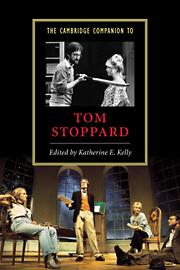13 - “Is postmodernism?”
Stoppard among/against the postmoderns
from PART 3 - CULTURE AND CONTEXT
Published online by Cambridge University Press: 28 May 2006
Summary
A. Tom Stoppard is a postmodernist;
and B. Tom Stoppard refutes postmodernism.
These two things are one.
In my epigram I adopt Wallace Stevens’s opening gambit from “Connoisseur of Chaos” for two reasons (which may be one). First, it is necessary to drive home the point early that Stoppard and his plays will frustrate any attempt to impose an either/or logic in terms of their relationships to postmodern ideas and aesthetics. “None of us is classifiable,” Stoppard once told David Nathan. “Even the facility to perceive and define two ideas such as classical and romantic in opposition to each other indicates that one shares a little bit of each.” The comment was made in the specific context of elucidating Arcadia (and this provides the second reason for invoking Stevens’s chaotic connoisseur) but Stoppard’s work in general, and his relationship to postmodernism in particular, is increasingly informed by this notion, which reaches its fullest expression in his 1993 masterpiece.
Thus, the split/doubled title of this chapter indicates that Stoppard expresses keen interest in certain intellectual, aesthetic, and ideological positions associated with postmodern art and drama, while he is at the same time antipathetic to, and even staunchly critical of, some of the more radical notions and claims of postmodern social theory and its image of the human subject. Stoppard does not, then, fully inhabit the postmodern terrain, but he often travels there and traverses it, speaking the language of the region faultlessly even as he stops occasionally to arraign it with deadpan irony or wit. As he investigates such postmodern issues as the death of the author, the loss of sustaining cultural narratives, the waywardness of language, and the fragmented nature of identity, Stoppard nevertheless exhibits a critical distance and negative capability toward the social, cultural, and aesthetic theories that constitute the loosely confederated discourse of postmodernism.
- Type
- Chapter
- Information
- The Cambridge Companion to Tom Stoppard , pp. 213 - 228Publisher: Cambridge University PressPrint publication year: 2001
- 3
- Cited by



